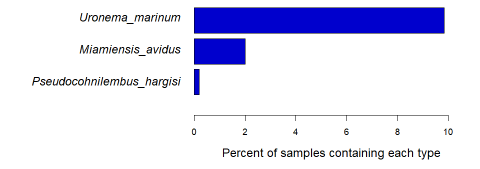Summary
A disease of fish and crustaceans caused by infection with a group of parasitic ciliates. This disease is called Uronema or Red Band Disease in the aquarium hobby, and Scuticociliatosis in the research literature.
Symptoms
- Skin lesions, often reddish
- Reduced feeding
- Reduced and abnormal swimming
- Increased mucus on skin
- Darkened or roughened skin
- Often results in high mortality, sometimes without obvious symptoms
Causes
This disease is caused by multiple ciliate species. All species identified so far are within the order Philasterida. However it is unclear whether all members of this Order are parasitic, since many Philasterid species have not been reported in disease studies. Some parasitize fish and other crustaceans; here we focus on those infecting fish.
The list of known parasites causing Scuticociliatosis in fish includes:
- Uronema marinum
- Uronema nigricans
- Miamiensis avidus
- Philasterides dicentrarchi
- Pseudocohnilembus persalinus
- Pseudocohnilembus longisetus
- Pseudocohnilembus hargisi
Based on the phylogenetic relationships in this group of ciliates, we consider the following ciliates to be suspected parasites because they are closely related to the known parasites shown above:
- Parauronema virginianum
- Uronema heteromarinum
- Uronema elegans
- Pseudocohnilembus marinus
Prevalence in the hobby
This is the most common group of parasites we encounter in clients’ samples.


Treatments
If you catch it early enough, while the infection is external, these infections can be treated reasonably effectively. Once the infection invades into internal tissues treatments are rarely effective. Treatments include:
- Formalin
- Metronidazole
- Freshwater dips
- Hydrogen peroxide
Additional Resources
Testing for ciliate parasites
You can test your tank for parasitic ciliates causing Uronema / Scuticociliatosis using the tankDNA test , which screens for eukaryotic parasites of all kinds.
